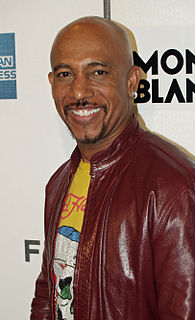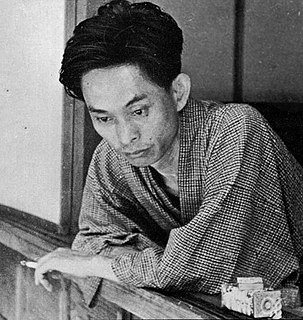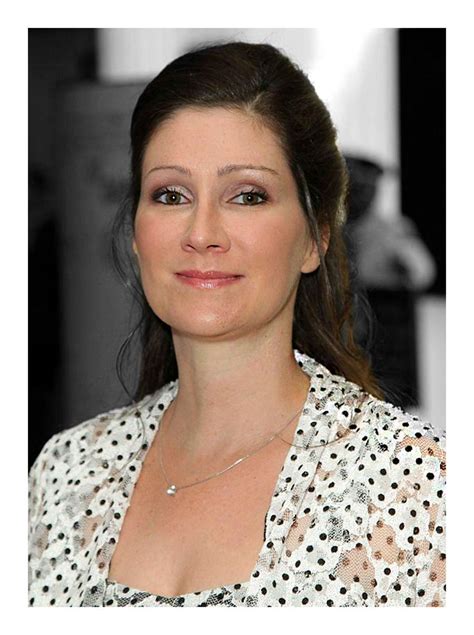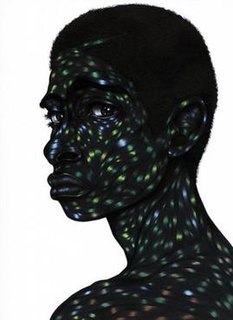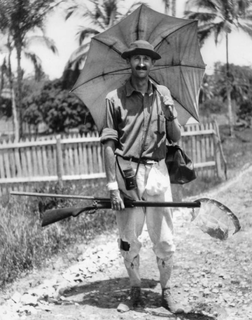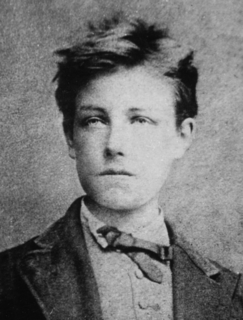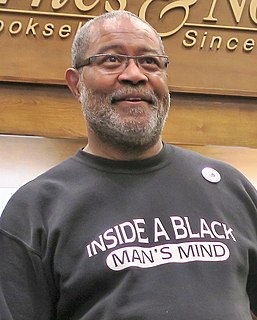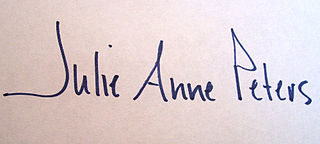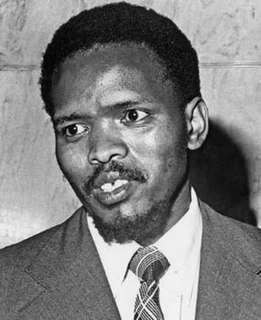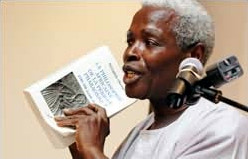Top 231 Blackness Quotes & Sayings - Page 4
Explore popular Blackness quotes.
Last updated on April 15, 2025.
I'm not talking about my children's father'he's a wonderful black man, the hero of my life, and he's never disrespected or betrayed me. But I'm talking about what I see in the streets and in the media, this naked hatred that black men have towards the authentic black woman'which is really an indication of black men's hatred for blackness itself.
Blackness also has positive dimensions, those that bear the political meanings of African American people, among other blacks, who have struggled for self-determination and freedom for centuries. The absence of such an identity doesn't automatically guarantee that we will be free of the images and ideals that fuel stereotypes about black identity. Changing the name will not alter the reality.
None of us should be ashamed to speak of our class power or lack of it. Overcoming fear, even the fear of being immodest, and acting courageously to bring issues of class- especially radical standpoints – into the discourse of blackness is a gesture of militant defiance, one that runs counter to bourgeois insistence that we think of “money” in particular and class in general as private matters.
There is fascism, leading only into the blackness which it has chosen as its symbol, into smartness and yapping out of orders, and self-righteous brutality, into social as well as international war. It means change without hope. Our immediate duty - in that tinkering which is the only useful form of action in our leaky old tub - our immediate duty is to stop it.
The sound of the freezing of snow over the land seemed to roar deep into the earth. There was no moon. The stars, almost too many of them to be true, came forward so brightly that it was as if they were falling with the swiftness of the void. As the stars came nearer, the sky retreated deeper and deeper into the night color. The layers of the Border Range, indistinguishable one from another, cast their heaviness at the skirt of the starry sky in a blackness grave and somber enough to communicate their mass. The whole of the night scene came together in a clear, tranquil harmony.
Look at the sky. It’s not dark and black and without character. The black is, in fact deep blue. And over there: lighter blue and blowing through the blues and blackness the winds swirling through the air and then shining, burning, bursting through: the stars! And you see how they roar their light. Everywhere we look, the complex magic of nature blazes before our eyes.
And then it happens. Up and down the row, the victors begin to join hands. Some right away, like the morphlings, or Wiress and Beetee. Others unsure but caught up in the demands of those around them, like Brutus and Enobaria. By the time the anthem plays its final strains, all twenty-four of us stand in one unbroken line in what must be the first public show of unity among the districts since the Dark Days. You can see the realization of this as the screens begin to pop into blackness. It's too late, though. In the confusion they didn't cut us off in time. Everyone has seen.
Arguably the most important parallel between mass incarceration and Jim Crow is that both have served to define the meaning and significance of race in America. Indeed, a primary function of any racial caste system is to define the meaning of race in its time. Slavery defined what it meant to be black (a slave), and Jim Crow defined what it meant to be black (a second-class citizen). Today mass incarceration defines the meaning of blackness in America: black people, especially black men, are criminals. That is what it means to be black.
On the train: staring hypnotized at the blackness outside the window, feeling the incomparable rhythmic language of the wheels, clacking out nursery rhymes, summing up moments of the mind like the chant of a broken record: god is dead, god is dead. going, going, going. and the pure bliss of this, the erotic rocking of the coach. France splits open like a ripe fig in the mind; we are raping the land, we are not stopping.
February. Get ink, shed tears. Write of it, sob your heart out, sing, While torrential slush that roars Burns in the blackness of the spring. Go hire a buggy. For six grivnas, Race through the noice of bells and wheels To where the ink and all you grieving Are muffled when the rainshower falls. To where, like pears burnt black as charcoal, A myriad rooks, plucked from the trees, Fall down into the puddles, hurl Dry sadness deep into the eyes. Below, the wet black earth shows through, With sudden cries the wind is pitted, The more haphazard, the more true The poetry that sobs its heart out.
Sure, I’m dramatic and sloppily semi-cynical and semi-sentimental. But, in leisure years I could grow and choose my way. Now I am living on the edge. We all are on the brink, and it takes a lot of nerve, a lot of energy, to teeter on the edge, looking over, looking down into the windy blackness and not being quite able to make out, through the yellow, stinking mist, just what lies below in the slime, in the oozing, vomit-streaked slime; and so I could go on, my thoughts, writing much, trying to find the core, the meaning for myself.
No one knows how greatness comes to a man. It may lie in his blackness, sleeping, or it may lance into him like those driven fiery particles from outer space. These things, however, are known about greatness: need gives it life and puts it in action; it never comes without pain; it leaves a man changed, chastened, and exalted at the same time--he can never return to simplicity.
I love the night passionately. I love it as I love my country, or my mistress, with an instinctive, deep, and unshakeable love. I love it with all my senses: I love to see it, I love to breathe it in, I love to open my ears to its silence, I love my whole body to be caressed by its blackness. Skylarks sing in the sunshine, the blue sky, the warm air, in the fresh morning light. The owl flies by night, a dark shadow passing through the darkness; he hoots his sinister, quivering hoot, as though he delights in the intoxicating black immensity of space.
I cling to my anger with every ounce of humanity left in my ruined body, but it's no use. It slips away, like a wave from shore. I am pondering this sad fact when I realize the blackness of sleep is circling my head. It's been there awhile, biding it's time and growing closer with each revolution. I give up on rage, which at this point has become a formality, and make a mental note to get angry again in the morning. Then I let myself drift, because there's really no fighting it.
Across the curve of the earth, there are women getting up before dawn, in the blackness before the point of light, in the twilight before sunrise; there are women rising earlier than men and children to break the ice, to start the stove, to put up the pap, the coffee, the rice, to iron the pants, to braid the hair, to pull the day's water up from the well, to boil water for tea, to wash the children for school, to pull the vegetables and start the walk to market, to run to catch the bus for the work that is paid. I don't know when most women sleep.
Where some may see flat, static narratives, I see a spectrum of tonal gradations and realities. What I am creating is literally black portraiture with ballpoint pen ink. I'm looking for that in-between state in an individual where the overarching definition is lost. Skin as geography is the terrain I expand by emphasizing the specificity of blackness, where an individual’s subjectivity, various realities and experiences can be drawn onto the diverse topography of the epidermis. From there, the possibilities of portraying a fully-fledged person are endless.
Will moved to object, but it was too late; Henry had already pressed the button. There was a blinding flare of light and a whooshing sound, and the room was plunged into blackness. Tessa gave a yelp of surprise, and Jem laughed softly. "Am I blind?" Will's voice floated out of the darkness, tinged with annoyance. "I'm not going to be at all pleased if you've blinded me, Henry.
One of the facets of growing up the way I did, I never had the experience of being solely in the black community. Even my family, my mother is what they call Creole, so she's part French, part black, and grew up in Louisiana. It's a very specific kind of blackness that is different than what is traditionally thought of as the black community and black culture. So, I never felt a part of whatever that was.
I'm what they call a 'non-black person of color': NBPOC. It's easy and seductive and common to mobilize around these identity issues, but often that's done at the expense of considering structural anti-blackness. That puts everything in a slightly different light for me, especially because of where I am and why - where I am in the world of the arts, where I live, in Harlem - and the music that I've been able to make, whom I've been able to make it with, who has nurtured me. It's not just about solidarity. It's actually about debt.
In my dream it was very dark, and what dim light there was seemed to be radiating from Edward's skin. I couldn't see his face, just his back as he walked away from me, leaving me in the blackness. No matter how fast I ran, I couldn't catch up to him; no matter how loud I called, he never turned. Troubled, I woke in the middle of the night and couldn't sleep again for what seemed like a very long time. After that, he was in my dreams nearly every night, but always on the periphery, never within reach.
I shut my eyes and all the world drops dead; I lift my lids and all is born again. (I think I made you up inside my head.) The stars go waltzing out in blue and red, And arbitrary blackness gallops in: I shut my eyes and all the world drops dead. I dreamed that you bewitched me into bed And sung me moon-struck, kissed me quite insane. (I think I made you up inside my head.)
Humanity is our common lot. All men are made of the same clay. There is no difference, at least here on Earth, in the fate assigned to us. We come of the same void, inhabit the same flesh, are dissolved in the same ashes. But ignorance infecting the human substance turns it black, and that incurable blackness, gaining possession of the soul, becomes Evil.
I'm just challenging white supremacy at its intellectual heart every day. It's a pedagogy that I deploy against some of the most vicious resistance to blackness that whiteness is able to throw up. I engage in a lot of intellectual combat with supremacists and with the predicate of white supremacy and white indifference to black identity, and brown and red and yellow identity too, for that matter.
Part of what I am dealing with, with this blackness, is asking the question, "Where are those black people, who are as dark as the description of a young black boy that Solomon Northup gives in 12 Years A Slave?" He describes the young black 14-year-old boy as "blacker than any crow." You have to question if he is using that metaphorically or as a descriptive?
Part of writing a novel is being willing to leap into the blackness. You have very little idea, really, of what's going to happen. You have a broad sense, maybe, but it's this rash leap. It's like spelunking. You kind of create the right path for yourself. But, boy, are there so many points at which you think, absolutely, I'm going down the wrong hole here. And I can't get back to the right hole. I'm not going to be able to get this section back to the right hole - so I'm just going to have to cut it.
... the only other place comparable to these marvelous nether regions, must surely be naked space itself, out far beyond atmosphere, between the stars, where sunlight has no grip upon the dust and rubbish of planetary air, where the blackness of space, the shining planets, comets, suns, and stars must really be closely akin to the world of life as it appears to the eyes of an awed human being, in the open ocean, one half mile down.
Hope, and fear. Twin forces that tugged at us first in one direction and then in another, and which was the stronger no one could say. Of the latter we never spoke, but it was always with us. Fear, constant companion of the peasant. Hunger, ever at hand to jog his elbow should he relax. Despair, ready to engulf him should he falter. Fear; fear of the dark future; fear of the sharpness of hunger; fear of the blackness of death.
He would say, "How funny it will all seem, all you've gone through, when I'm not here anymore, when you no longer feel my arms around your shoulders, nor my heart beneath you, nor this mouth on your eyes, because I will have to go away some day, far away..." And in that instant I could feel myself with him gone, dizzy with fear, sinking down into the most horrible blackness: into death.
If I were really asked to define myself, I wouldn’t start with race; I wouldn’t start with blackness; I wouldn’t start with gender; I wouldn’t start with feminism. I would start with stripping down to what fundamentally informs my life, which is that I’m a seeker on the path. I think of feminism, and I think of anti-racist struggles as part of it. But where I stand spiritually is, steadfastly, on a path about love.
Hour of Stars (1920) The round silence of night, one note on the stave of the infinite. Ripe with lost poems, I step naked into the street. The blackness riddled by the singing of crickets: sound, that dead will-o'-the-wisp, that musical light perceived by the spirit. A thousand butterfly skeletons sleep within my walls. A wild crowd of young breezes over the river.
…“white supremacy” is a much more useful term for understanding the complicity of people of color in upholding and maintaining racial hierarchies that do not involve force (i.e slavery, apartheid) than the term “internalized racism”- a term most often used to suggest that black people have absorbed negative feelings and attitudes about blackness. The term “white supremacy” enables us to recognize not only that black people are socialized to embody the values and attitudes of white supremacy, but we can exercise “white supremacist control” over other black people.
In the racialized space of capitalist gentrification, police are not only arbiters of the peace, they are the muscle of retail racism: You can only be in this space if you transcend your blackness by showing us some green dollars. Even then, there is no guarantee that green will transcend your black skin.
The brain "fills in" the missing information from the blind spot. Notice what you see in the location of the dot when it's in your blind spot. When the dot disappears, you do not perceive a hole of whiteness or blackness in its place; instead your brain invents a patch of the background pattern. Your brain, with no information from that particular spot in visual space, fills in with the patterns around it. You're not perceiving what's out there. You're perceiving whatever your brain tells you.
There is a wide, yawning black infinity. In every direction, the extension is endless; the sensation of depth is overwhelming. And the darkness is immortal. Where light exists, it is pure, blazing, fierce; but light exists almost nowhere, and the blackness itself is also pure and blazing and fierce.
I think about my choice. Either outcome is bleak. If I stay and live through high school, go to college, get a job, what will ever change? This blackness inside will never go away. I don't make friends; I'll always be alone. If I go, at least there's hope of peace. Chance of a new and better life on the other side.
The sky aft was dark as pitch, but the moon still shone brightly ahead of us and lit up the blackness. Beneath its sheen a huge white-topped breaker, twenty feet high or more, was rushing on to us. It was on the break-the moon shone on its crest and tipped its foam with light. On it rushed beneath the inky sky, driven by the awful squall behind it.
For a few minutes, maybe, life lingers in the tissues of some outlying regions of the body. Then, one by one, the lights go out and there is total blackness. And ifsome part of the non—entity we called George has indeed been absent at this moment of terminal shock, away out there on the deep water, then it will return to find itself homeless.
If you know someone who’s depressed, please resolve never to ask them why. Depression isn’t a straightforward response to a bad situation; depression just is, like the weather. Try to understand the blackness, lethargy, hopelessness, and loneliness they’re going through. Be there for them when they come through the other side. It’s hard to be a friend to someone who’s depressed, but it is one of the kindest, noblest, and best things you will ever do.
I sat on the bed. I looked at the Rorschach blot. I tried to make it look like a spreading tree, shadows pooled beneath it, but it didn't. It looked more like a dead cat I once found, the fat, glistening grubs writhing blindly, squirming over each other, frantically tunneling away from the light. But even that isn't the real horror. The horror is this: in the end, it is simply a picture of empty meaningless blackness.
Ah, but you, Darkness, you know all this. I tell you night after night. Nothing will shock you. Maybe I go on at you in the hope that there's something beyond you. Some nights I sit here and talk and sob and stare out into the blackness thinking that if I look hard enough I'll see the light behind. But I stay out until the break of day, waiting, hoping, and there's only sunrise again.
The golden line is drawn between winter and summer. Behind all is blackness and darkness and dissolution. Before is hope, and soft airs, and the flowers, and the sweet season of hay; and people will cross the fields, reading or walking with one another; and instead of the rain that soaks death into the heart of green things, will be the rain which they drink with delight; and there will be sleep on the grass at midday, and early rising in the morning, and long moonlight evenings.
Black Consciousness is an attitude of the mind and a way of life, the most positive call to emanate from the black world for a long time. Its essence is the realisation by the black man of the need to rally together with his brothers around the cause of their oppression - the blackness of their skin - and to operate as a group to rid themselves of the shackles that bind them to perpetual servitude.
That was the thing: Once, the difference between light and dark had been basic. One was good, one bad. Suddenly, though, things weren’t so clear. The dark was still a mystery, something hidden, something to be scared of, but I’d come to fear the light, too. It was where everything was revealed, or seemed to be. Eyes closed, I saw only the blackness, reminding me of this one thing, the most deep of my secrets; eyes open, there was only the world that didn’t know it, bright, inescapable, and somehow, still there.
True, I used to see a lot of hope. I saw men tear down the veils behind which the truth had been hidden. But then the same men, when they have power in their hands at last, began to find the veils useful. They made many more. Life has not changed. Only some people have been growing, becoming different, that is all. After a youth spent fighting the white man, why should not the president discover as he grows older that his real desire has been to be like the white governor himself, to live above all the blackness in the big old slave castle?
Blackness is an ocean, a universe, a possibility that can never be exhausted. And so we have to constantly reaffirm the necessity of excavation, of archiving and curating, but also exploring, and understanding afresh and learning for the first time what it is that we need to know, and what the limits and boundaries are, and what the themes and preoccupations should be, and what the redemptive character of that erudition is. I find myself in the exciting position of doing all that, and at the same time having the obligation to explain to white people what the deal is.
